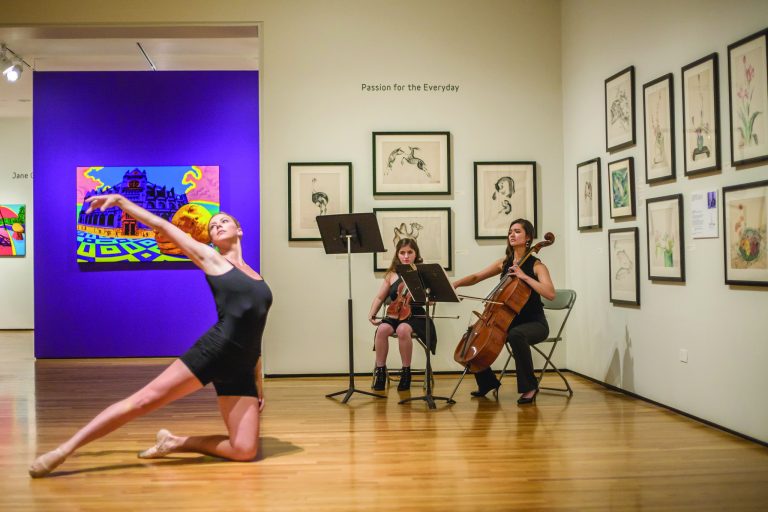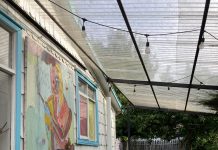
Alondra Sierra
For two nights, “Still We Rise: A Collaborative Performance of Art, Dance, Music, Theatre, and Poetry” played at The Art, Design & Architecture Museum. This multi-arts project was dedicated to the DACA recipients at UCSB, using movements, sounds, and words to channel a multicultural society that is too often divided by political polarity and blame.
Assistant dance professor and choreographer Monique Meunier’s opening words described the collaboration between various forms of art — a banal metaphor for how all members of society must work together and support one another.
“That’s how we can rise,” Meunier said before leaving the audience with the performers.
First on set was a preview performance of “Staging the Daffy Dame,” a new play set to premiere in March. The preview scene centered on two students preparing for a production of their own. UCSB alumna Anne Garcia-Romero wrote the preview scene and Risa Brainin directed it.
Though the message was unclear until the end, one could understand that the scene tackled an issue that is rarely spoken about by the time actress Kerry Jacinto upsettingly walked off stage. The scene dealt with criticism towards immigrant children and people who arrive to the U.S. at a very young age and don’t speak their “native language.”
As much as the performance was a perfect opportunity to promote a new project from UCSB’S Theater Department, it was commendable to see this unspoken social issue within the immigrant community openly communicated.
Following the first performance, poet Rick Benjamin enriched the audience with four provocative original poems about immigrant roots and their central role in our society. Benjamin read the poems in between the performances. One of his most thought-provoking pieces was “Prospective Immigrants Please Note,” a reminder that “the door itself makes no promises, it is only a door.”
Perhaps, Benjamin is hinting at the sacrifices immigrants take without guarantee of results. And, “at the cemetery, walnut grove plantation, south carolina, 1989,” an audience favorite judging by the several “mmmh” and head nods resulting from Benjamin’s illustration of the immigrant’s invisibility yet indisputable cultivations in our society.
Benjamin’s words still lingered in the room as the music began and dancers materialized themes of resilience, fear, passion, and most of all, unity. Emotional movements and collective routines from all ten dancers always involved lifting one another up and joining in the center.
If the message was unclear at that point, then Meunier made it very obvious in the last cohesive performance, which was predictable but nonetheless intriguing. All ten dancers came together at the center stage before recitation of Maya Angelou’s “Still I Rise” gripped the audience’s attention as the spectrum of voices repeated: “Still I rise.”
Prior to the performance, I thought I would witness an overly-drawn artistic interpretation of the immigrant story’s well-known tropes — with emphasis on labor and struggle but never actually distilling the importance of this persevering group.
Though resilient immigrant life and American Dream stories are always valuable, it is time to take a more urgent and direct approach to address the issues that Dreamers, DACA recipients, and immigrants face in our society.
More so, a strong message seemed necessary for this project considering the harsh ambiguity of our political climate.
For example, last September, President Donald Trump announced the end of DACA, imposing its termination date to March of this year. To understand the impact, consider that DACA protected approximately 800,000 students in the U.S. So, this community faces uncertainty to say the least.
Fortunately, Monique Meunier led “Still We Rise.” As a daughter of Cuban and Ecuadorian immigrant parents, Meunier was familiar and thoughtful in her artistic approach. The performance as a whole was a reminder that during these divisive times, rather than point fingers or look the other way, we must all come together and support people who need our help.
And to the DACA students and Dreamers at UCSB who face challenges and struggles only they can understand, there is hope and you will rise.







